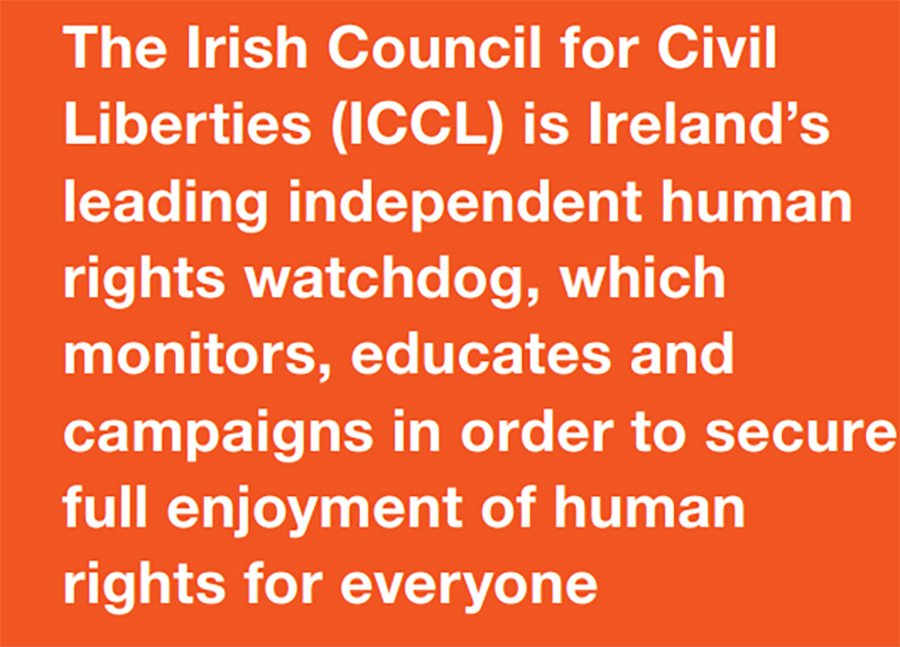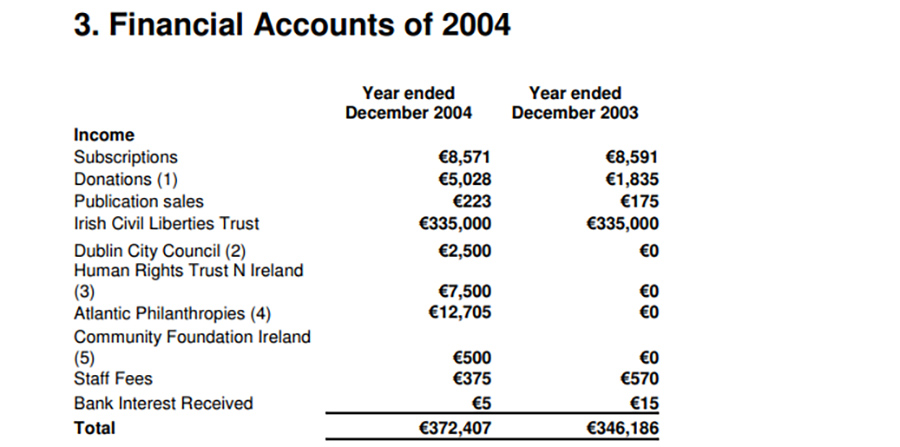Last week, we examined how the Irish Council for Civil Liberties (ICCL) has submitted a wish list for a €10 million spend from next month’s Budget. It will be interesting to see whether, or to what extent, the Government will accede to a further expansion of the rights sector, with consequent benefits for all involved in terms of resourcing and jobs.
What is clear is that the ICCL is now an established voice within the advocacy NGO world and has played a key role in pushing an agenda that is shared across the left liberal spectrum.
In truth, that spectrum embraces not only NGOs in that sphere, or even the self-identified parties of the Left, but is an ideology that has captured the leaderships of both Fine Gael and Fianna Fáil who have been in power when key parts of that agenda have been put into place.
The ICCL, founded in 1976, had relatively humble origins and was in a confrontational relationship with the state at a time when there were concerns regarding the use of the Offences against the State Act and allegations about a “heavy gang” which was alleged to have been operating within Garda Special Branch.
Its transformation from a small voluntary group to one which, according to its 2022 Report, now employs 13 full time staff, and had an income of €1,182,622 has been remarkable.
It is under the formal trusteeship of the Trust for Civil Liberties, Human Rights and Fundamental Freedoms which is registered as a charity but its accounts show only a modest income, and a contribution of just €14,774 to the ICCL in 2022. No member of the Board of the ICCL is a trustee of the Trust, but ICCL Executive Director Liam Herrick is a Trustee.
That transformation from being a voluntary outfit to well-funded professional and sophisticated operation did not happen by accident. Nor was it funded by its own small membership base which accounted for less than 2% of ICCL income in 2022. It is mainly supported by international foundations, and it is to them that it owes its current position within Irish public life.
The main contributor to that has been Chuck Feeney’s Atlantic Philanthropies whose role in the lift off of migrancy NGOs we have already examined, and whose overall importance in, to a large extent, creating the NGO advocacy sector as we know it, shall continue to be the focus of this series.
Since 1998, the ICCL has been granted $12,442,989 by Atlantic – all of which has been channelled through the Trust. The ICCL itself was placed on a professional basis by the 1998 grant of €253,948 for the purposes of assisting the ICCL in “appointing a director and to contribute to the cost of running a full-time office.” A further €6,666 was granted in 1998 to engage a consultant “to review its current operations and make recommendations for it to be a more focused and efficient civil rights organisation in the future.”
It has certainly done that, and there is little doubt but that the focus of the ICCL has shifted from issues related to the commonly understood civil liberties of Irish citizens in their engagement with the state, and in particular with the legal and police system, to what are subjectively individual rights, in particular abortion. Not only that but the civil liberties watchdog supports the proposed Government “hate” legislation.
The rapid change which the Atlantic funding made can be seen from the ICCL’s own annual reports. Its Review of 2001 is a much more modest document than the glossy publication which the ICCL now issues, but the impact of the Feeney money was already being felt.
Donncha O’Connell, now Professor of Law at NUI Galway, had been appointed as its first Director with the help of the Atlantic money.
Liam Herrick had been appointed as Research and Parliamentary Officer in 2001. This had also been made possible through an Atlantic grant of €147,300. He eventually became Executive Director in 2016, having previously been the Executive Director of another Atlantic beneficiary the Irish Penal Reform Trust, and having acted as advisor to President Michael D. Higgins.
He has also served as a member of the Irish Human Rights and Equality Commission (IHREC), and been a part of a Ministerial Review group. The idea that these guys are critically outside of the Establishment is almost comical.
What is also clear from the 2001 Review is that the ICCL was starting to focus on abortion as a key concern and had, in February 2002, published a position paper opposing what it claimed was the granting of the “primacy to the right of life of a foetus” which it said “demeaned women.” The ICCL called for a No vote in the March 2002 referendum.

The Review also referred to the fact that the ICCL was “currently in the process of making a grant application to one of its funding organisations in order to commence this next stage of its development.” That was to pay huge dividends as, assuming that Atlantic was the organisation in question, it certainly delivered.
In 2002, the Trust was granted €703,000 by Atlantic to cover the “core costs” of the ICCL and was designed to “[a]ssist in recruiting a new director and support core operational costs over a thirteen month period as the organisation conducts an organisation review, finalises its strategic plan.”
This paid off handsomely in 2005 when Atlantic granted the Trust €3,000,000. This was to “enhance the protection of the human rights of the disadvantaged in Ireland by strengthening the capacity of the Irish Council for Civil Liberties.” The change wrought was immediately manifested in the Annual Report. The 2005 version is of the same aesthetic quality of the annual reviews, but by 2006 we are presented with a much snazzier production.
The 2005 report highlights the “lead role” which the ICCL had played in opposing the Citizenship referendum – a measure which was supported by an overwhelming majority of the electorate, with almost 80% voting Yes.
This is another indication of the part played by Atlantic-funded entities on the No side, and indeed a strong pointer to one of the main reasons why Feeney began to pump so much money into the advocacy NGOs at this point.

The report lists an income of €372,407 for 2004, with just €12,705 attributed to Atlantic. It is noticeable, however, that the Civil Liberties Trust is credited with having contributed €335,000, most of that presumably having come from Atlantic. Total staff costs remained modest, although this soon increased with the full coming on stream of the foundation cash.

Curiously, the accounts for 2006 show both a fall in income and appear to show a different and much greater income for 2005, boosted by grants in 2005 of €659,441, which are not shown in the 2005 accounts. There is a note which states: “The funds have been reduced by €212,151 due to grants that were historically accounted for in ICCL Association but not spent as at 31 December 2005. Those grants have been transferred to ICCL Limited and are therefore showing as negative income on the ICCL Association 2006 Income Statement.”
The Report does refer to the fact that “the ICCL received the majority of its funding from the Atlantic Philanthropies (AP)” and that this had enabled it to expand its staff and move into “purpose designed premises.” Happy days.
Since then the sums ICCL has received from Atlantic include a further €150,000 in 2010 to help it prepare a shadow report in response to the Irish section of the United Nations Universal Periodic Review (UPR); a further €2,100,000 in 2020 for “core support”; €2,825,000 in 2013 to help enhance its “sustainable and independent capacity,” and another grant of €500,000 in 2017.
It is worth bearing in mind all of the funding that the ICCL has received, as well as its current balance sheet, when pondering both the “sustainable” and “independent” aspects of its work. Its support for the state’s proposed “hate speech” legislation and the reference in its 2012 Report to the ICCL regarding as its priority “the urgent need to reform Ireland’s antediluvian abortion laws” suggests that it has moved a long way from its initial self-defined role as a watchdog over the abuse of state powers.

The ICCL of course is not unique, either in its dependency on Atlantic and other left liberal foundation funding, nor in its owing the greater part of its current powerful position to that assistance. Gript shall be shedding light on others of the beneficiaries over the coming weeks.
[…] Eire NGOs have been profitable in bringing abortion in below the duvet of human rights ( https://gript.mystagingwebsite.com/how-e12-million-in-funding-from-abroad-transformed-the-irish-council-for-civil-libe… ). Different NGOs deal with legitimizing sexual perversion, reminiscent of Lesbians In Cork ( […]
[…] Ireland NGOs have been successful in bringing abortion in under the cover of human rights ( gript.ie/how-e12-million-in-funding-from-abroad-transformed-the-irish-council-for-civil-liberties/ ). Other NGOs focus on legitimizing sexual perversion, such as Lesbians In Cork […]